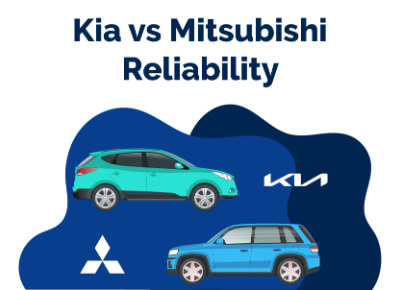Kia vs Mitsubishi: Reliability Comparison
July 12, 2023


Chris is Head of Content for FindTheBestCarPrice and is based out of Philadelphia, PA. As a seasoned automotive industry analyst and car enthusiast, he ensures the highest level of quality across all our content and curates our picks for the best deals each month.
Chris studied information systems and marketing at Drexel University and writes about a wide range of topics ranging from car buying tips to troubleshooting common mechanical issues.
When he’s not thinking about cars, he likes to stay in with his dog and make an “attempt” to finish a crossword puzzle (he’s not quite at the Saturday/Sunday level…yet). As a former cheesemonger, Chris still has a “sharp” passion for all things cheese, and his fridge is always loaded with it!
Chris also has a passion for things that go fast, and drones are no exception. He spends some of his time writing for Dronesourced.
The automotive industry is a dynamic and multifaceted realm where many factors converge to shape the driving experience. Among these variables, vehicle reliability is a pivotal component that can make or break a brand's reputation.
As such, discerning consumers seeking to invest in a new car often scrutinize the reliability ratings of potential contenders, and two popular options that frequently feature in such deliberations are Kia and Mitsubishi.
These two automotive powerhouses have forged distinct niches, offering cutting-edge designs, advanced features, and unparalleled performance.
Yet, regarding reliability, a more granular examination of their respective track records reveals intriguing insights that can serve as a compass for prospective buyers navigating the complex terrain of car shopping. This article will cover Kia vs. Mitsubishi's reliability.
Table of Contents
- Kia vs. Mitsubishi Reliability: Detailed Comparison
- Which Is the Best Car: Kia or Mitsubishi?
- 1. Kia vs. Mitsubishi Reliability: Design
- 2. Kia vs. Mitsubishi Reliability: Repair and Maintenance Cost
- 3. Kia vs. Mitsubishi Reliability: Durability
- 4. Kia vs. Mitsubishi Reliability: Engine
- 5. Kia vs. Mitsubishi Reliability: Gas Mileage
- 6. Kia vs. Mitsubishi Reliability: Technology
- 7. Kia vs. Mitsubishi Reliability: Safety
- Final Verdict
- Best Car Deals by Category
Kia vs. Mitsubishi Reliability: Detailed Comparison
| Features | Kia | Mitsubishi |
| Design | ||
| Repairs and Maintenance Cost | ||
| Durability | ||
| Engine | ||
| Gas Mileage | ||
| Technology | ||
| Safety |
Which Is the Best Car: Kia or Mitsubishi?
The quest for the ultimate car often pits Kia and Mitsubishi against each other, as both brands offer various features and designs that cater to different driving preferences.
While these automotive titans have distinctive attributes, determining which one reigns supreme requires a nuanced analysis of their strengths and weaknesses.
Kia's fleet of vehicles boasts cutting-edge designs and robust engines, such as the famous Stinger, which boasts a twin-turbo V6 engine that delivers an impressive 365 horsepower.
Meanwhile, Mitsubishi's Eclipse Cross, a crossover SUV, offers a smooth ride thanks to its advanced suspension system and a fuel-efficient turbocharged engine that can generate up to 152 horsepower.
However, reliability is a crucial consideration for discerning car buyers. In this regard, Kia holds a slight edge over Mitsubishi. Kia consistently earns high ratings in consumer reliability surveys, often outperforming its more established competitors.
On the other hand, Mitsubishi has struggled in this area, with some of its models needing better ratings for reliability, particularly in the crucial categories of transmission and electrical systems.
Safety is another crucial component to be considered when choosing the best car. Kia and Mitsubishi have invested heavily in advanced safety features like lane departure warnings and blind-spot detection.
However, Kia's safety features are more comprehensive, with innovative additions such as the Safe Exit Assist system, which prevents passengers from opening doors into oncoming traffic.
1. Kia vs. Mitsubishi Reliability: Design
Kia's design philosophy emphasizes boldness, with dynamic lines and aggressive styling that sets it apart from other brands.
The iconic "tiger-nose" grille is a testament to Kia's commitment to innovation, giving its vehicles a distinctive look that is hard to miss.
Kia's interiors are equally impressive, with modern and functional features that cater to drivers who value convenience and innovation.
On the other hand, Mitsubishi places a strong emphasis on generosity and providing an empowering experience for drivers.
The brand's design philosophy centers around robustness and ingenuity, which they believe are essential elements of the unique Mitsubishi experience.
Mitsubishi's innovative solutions and design details anticipate unexpected needs, stimulating the imagination and creating a driving experience that exceeds expectations.
Ultimately, both Kia and Mitsubishi have unique strengths that appeal to different driving preferences. However, when it comes to design, Kia's boldness and innovation give it an edge over Mitsubishi.
Kia's distinctive "tiger-nose" grille and modern interiors are hard to overlook and leave a lasting impression on drivers.
Winner: Kia
2. Kia vs. Mitsubishi Reliability: Repair and Maintenance Cost
Regarding maintenance and repair costs, Kia is known for offering affordable vehicles with reliable and cost-effective components.
Kia's vehicles are designed to be easy to maintain. The brand's excellent warranty, which includes ten years or 100,000 miles of powertrain coverage, gives drivers added peace of mind.
According to industry statistics, Kia models present a cost-effective option, with an average maintenance and repair cost of $8,442 over ten years, exceeding the industry average for popular brands by $1,628. The possibility of significant repairs within this timeframe is 19.92%.
On the other hand, Mitsubishi has a slightly lower average cost of ownership, with an intermediate maintenance and repair cost of $7,787 over ten years.
While the likelihood of a significant repair is slightly better at 18.18%, it's important to note that both rates are still higher than the industry average for famous brands.
Winner: Mitsubishi
3. Kia vs. Mitsubishi Reliability: Durability
Regarding reliability, Kia and Mitsubishi have established themselves as trustworthy brands that deliver quality vehicles built to last.
Kia's practical and affordable cars are designed to prioritize durability without compromising affordability, featuring robust and reliable components resulting in long-lasting vehicles.
The brand's lengthy warranty also provides drivers with added protection and peace of mind, ensuring their investment is well-protected over the long term.
On the other hand, Mitsubishi has a strong reliability rating of 4.0 out of 5.0 from RepairPal, ranking it sixth out of 32 car brands based on an average of 345 unique models.
While Mitsubishi may not produce the longest-lasting vehicles, they are known for manufacturing cars that do not require excessive maintenance and repairs, making them a reliable choice for everyday driving.
This reliability, combined with Mitsubishi's commitment to providing affordable and practical vehicles, makes it a compelling choice for car buyers prioritizing cost-effectiveness and reliability.
Winner: Mitsubishi
4. Kia vs. Mitsubishi Reliability: Engine
Kia and Mitsubishi's design philosophies prioritize performance and efficiency in different ways. Kia has developed a reputation for designing compact and efficient engines that prioritize fuel economy without sacrificing too much power.
This design approach is ideal for drivers who want to balance power and efficiency without compromising the driving experience.
In contrast, Mitsubishi's focus on raw power is evident in its turbocharged engine, which is compact yet incredibly powerful.
With an output of 295 horsepower and 310 lb-ft of torque, this engine is a true force to be reckoned with, providing drivers with an exhilarating driving experience.
The engine's lightweight design also makes for a smooth and agile feel on the road, delivering the handling and maneuverability that performance enthusiasts crave.
Winner: Mitsubishi
5. Kia vs. Mitsubishi Reliability: Gas Mileage
Kia's focus on efficiency and advanced technologies is evident in its impressive fuel economy, often exceeding 40 miles per gallon on the highway.
Their vehicles' efficient engines and lightweight designs allow exceptional gas mileage without sacrificing performance.
On the other hand, Mitsubishi has also made significant strides in fuel efficiency, boasting an impressive 25 miles per gallon in the city and 30 miles per gallon on the highway in some models.
This exceptional fuel economy is due to the car's lightweight frame, which reduces weight and boosts fuel efficiency, as well as its pioneering regenerative braking system, which captures energy otherwise lost during braking and routes it to the vehicle battery for a supplementary increase in fuel economy.
Winner: Kia
6. Kia vs. Mitsubishi Reliability: Technology
Kia offers a comprehensive suite of advanced technological features, which are both cutting-edge and affordable.
The brand's vehicles come equipped with state-of-the-art safety and driver assistance technologies, including automatic emergency braking, lane departure warning, and blind-spot monitoring.
Furthermore, Kia's UVO infotainment system is intuitive and user-friendly, boasting smartphone integration, voice recognition, and touchscreens that are effortless to use.
On the other hand, Mitsubishi Motors is a pioneer in electric vehicles, which is a commendable effort towards mitigating environmental concerns such as global warming and air pollution.
The company's EVs, such as the i-MiEV and the Minicab-MiEV, were developed primarily for city commuting.
However, the limited driving range and lack of charging infrastructure remain significant obstacles for EVs to overcome, hindering them from meeting broader expectations.
Winner: Kia
7. Kia vs. Mitsubishi Reliability: Safety
Kia has made significant advancements in vehicle safety, equipping their models with advanced features, including lane departure warnings, automatic emergency braking, and rearview camera systems.
Kia's latest models go even further with advanced safety features such as blind-spot detection, lane change assist, and intelligent cruise control.
Mitsubishi Motors is also committed to passenger safety, employing reinforced impact safety evolution (RISE) body construction to absorb energy and minimize damage in the event of a collision.
Additionally, Mitsubishi cars feature front pedestrian impact crumple zones integrated into the bumper and lip to reduce pedestrian injuries.
The brand also offers driver control enhancements such as active stability control (ASC), anti-lock braking system (ABS), and traction control logic (TLC).
Furthermore, advanced safety features like adaptive cruise control, forward collision mitigation, and lane departure warning work together to prevent accidents or reduce their impact.
Winner: Mitsubishi
Final Verdict
Kia and Mitsubishi offer reliable, affordable, and safe vehicles with unique features. Kia vehicles prioritize fuel economy, advanced technological features, and a lengthy warranty.
At the same time, Mitsubishi models are known for their robust and reliable components, innovative safety features, and pioneering electric vehicles. Regarding Kia vs. Mitsubishi reliability, Mitsubishi tops by a slight margin.
Best Car Deals by Category
Posted in Car Buying Tips, Car Troubleshooting |




